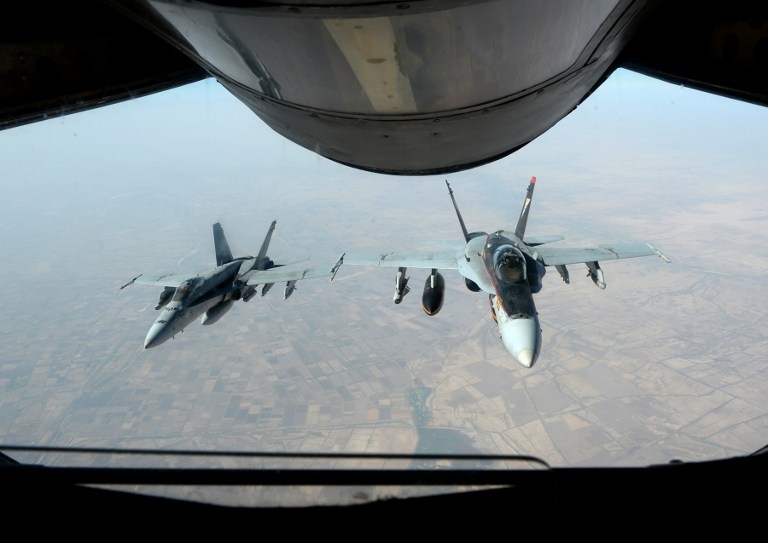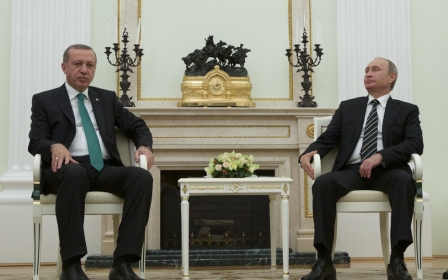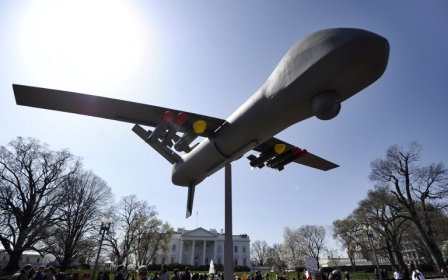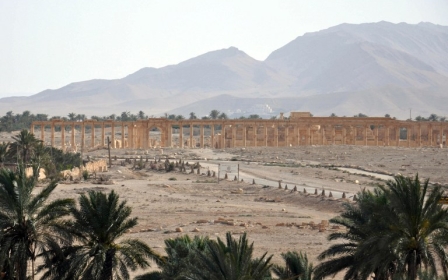Military officials say Iraq likely to welcome ‘no red line’ Russian air strikes

BAGHDAD - Iraq is likely to ask Russia to expand its role in the war against the Islamic State (IS) and conduct airstrikes on the group in the country, largely because the Russians have "no red lines" when it comes to hitting targets that have slowed US-led attacks, Iraqi security officials told Middle East Eye.
Last week, Baghdad announced that it will share "security and intelligence" information with Russia, Iran and Syria to counter the IS group which has seized most of the towns and cities in three Sunni-dominated provinces in the north and west of Iraq since June 2014.
There have also been reports that Iraq is mulling over allowing Russia to carry out airstrikes on IS in the country, a consideration that is ongoing, a senior Iraqi security official told MEE this week.
"Initially, I have no problem," Haider al-Abadi, Iraq's Prime Minister said in response to a question about the possibility of the implementation of Russia's airstrikes in Iraq on Saturday. "Actually, I would welcome it if the Russian side will be ready to strike Daesh (an Arabic acronym for IS) inside Iraq.”
"This option is on the table now,” the security official, speaking on condition of anonymity, told MEE, “and if the Iraqi government found that there is an interest to go with it, it will go with it”.
"The Iraqi government has priorities and defeating Daesh, as soon as possible, is at the top of these priorities, so this is an option," the official said.
No red lines
One of the main reasons Russia’s offer is appealing to the Iraqi government is that the protocols that the US-led coalition follow slow down its attack time and also limit the types of targets that are hit, the official and two others in senior security positions told MEE.
"They (US-led coalition) refuse to strike private cars, mosques, bridges, schools despite the fact Daesh militants are mainly using these places as headquarters," a senior military officer, who declined to be named, told MEE.
The US-led rules, which enforces the stringent verification of targets, regularly give IS militants enough time to save their supplies, equipment and fighters, they said.
"This is an exceptional war and our enemy has no rules," one of the officers said. "How [can] you ask me to stick to the rules while my enemy is brutally killing my people every day, enslaving my sisters and destroy my towns and cities?”
"Russians have no red lines, no complicated and restricted rules, so it would be easy for us to deal with them," he said.
Additionally, because many of the militants operating in Iraq are Caucasian, Chechen or Russian who may eventually head back to their home countries, Russia has a particular interest in monitoring their movements and learning who funds them and were they are headquartered.
No Russian presence yet
Iraq’s Ministry of Defence said that the cooperation with the Russians has not started yet and the preparations to establish a security-intelligent cooperation centre which will take place in Baghdad, are still going on.
"We still, until this moment, are preparing the centre and [there is] nothing tangible on the ground with respect to either the intelligent sharing information or the airstrikes," Nassier Nuri, the media advisor of the Iraqi Minister of Defense, told MEE.
"Iraqi government has not presented a request to the Russian Side to engage in the airstrikes [against IS] inside Iraq and we still talking about the intelligent cooperation, no more," Nuri said.
Reports earlier this week suggested that Russia and Iraq had agreed to allow the Russian air force to start using the country’s Al Taqaddum Air Base in Habbaniyah, west of Baghdad, as a launching pad for bombing missions against IS in Syria and northern Iraq.
But Nuri said that the reports are entirely inaccurate.
"This (Taqaddum) base is an advanced training base where some of the US trainers are stationed to train the Iraqi security forces and the (anti-IS Sunni) tribal fighters, and no Russians are there," Nuri said.
Iraq has had limited air force capability since the 1990s after the US army destroyed most of its aircrafts and equipment when former Iraqi leader Saddam Hussein invade Kuwait.
Since 2003, Iraq has made concerted efforts to rebuild its air fleet, signing contracts mainly with US companies to buy F-16 fighter jets.
But the delivery dates for the planes have been hampered by security, political and financial problems – aircrafts have been bought on credit since last summer - that have engulfed the country.
While an increased Russian role in Iraq could speed up the fight against IS, analyst say it might worsen the situation in the country as it becomes a battleground between the US and Russia and could further complicate the situation with multiple countries and interests at hand.
For decades, Iraq has had complicated ties with Iran. More recently, Iran has provided crucial support to Iraqis in their war against IS, including advising, equipping and funding Shia militias which are the backbone of the country’s armed forces after the dramatic collapse of the Iraqi army last summer.
The US-led coalition also been assisting Iraq in its fight, including striking IS in Iraq and Syria and training and advising Iraqi forces. Both sides insist that they are not coordinating their efforts but in fact they complement each other, analysts said.
Middle East Eye propose une couverture et une analyse indépendantes et incomparables du Moyen-Orient, de l’Afrique du Nord et d’autres régions du monde. Pour en savoir plus sur la reprise de ce contenu et les frais qui s’appliquent, veuillez remplir ce formulaire [en anglais]. Pour en savoir plus sur MEE, cliquez ici [en anglais].




